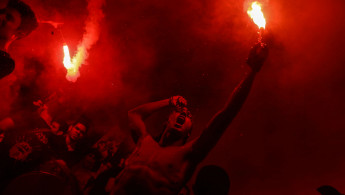How global terror finance networks crushed the Arab Spring
It has been five years since Mohammed Bouazizi lit a match and set fire to the Middle East, and the heat from the flames continues to engulf the region. A region shaken, revived, broken - yet still alive.
The glowing pulse of the embers still burning has become the timekeeper of the Arab world today. While some take pride in the valiant show of democracy that briefly flickered across Tunisia, Libya, Yemen and elsewhere, others denounce the "short-sighted" movements that have left much of the region worse off than where it started - the Arab Spring did not launch us forward, but rather flung us backwards, some "realists" suggest.
In places such as Bahrain and Saudi Arabia, debates surrounding "true democracy" were sparked as security forces were commanded to detain demonstrators, burn banners and revolt against revolutions - as global powers issued weak statements calling for their allies to go easy on civilians.
Simultaneously, uprisings in Syria, Yemen, Egypt and Libya were hailed and printed on front pages that were paraded on news-stands in London, Washington and Paris.
It is these exact differences in approach - "revolutions" on one hand, "unrests" on the other - that forced much of the world to question who, what, why and how the events of 2011 panned out. Dr Christopher Davidson, a historian and professor, spent months attempting to piece the puzzle together.
History repeated
In his newly published Shadow Wars: The Secret Struggle for the Middle East, Davidson argues that the events of 2011 were but mere replications of US and British foreign policies seen in the earlier parts of the 20th centuries.
"First it was the British empire - which then passed the baton on to the US - which saw the Middle East and Arab world as a resource-rich region that had to be fully exploited," he told The New Arab, adding that these resources were kept off-limits from their rival powers.
"The US needed to ensure that weak governments were emplaced that could serve the west - so we see throughout the 20th century, strategies used by the US to stop nationalist governments, nationalist fronts and halted the rise of democratic governments."
The Arab Spring therefore, "fundamentally disturbed that lucrative status quo".
A lending hand
"Western powers and their regional clients tried to curl a threat into an opportunity, so in countries where there was a potential for localised uprising, for example in Libya and Syria, but perhaps there was not enough to carry the movements nation-wide, some external assistance was given to get rid of regimes which have historically been antagonistic to western powers," he argued.
The assistance, as revealed by a range of "incontrovertible" evidence found in a range of "government archives, declassified documents, interviews with officials, court proceedings and leaked cables" gathered by Davidson, involved indirect sponsorship of hard-line religious groups that have since flourished across the region.
"We have a growing body of evidence now that western powers indirectly, through regional allies, have been weaponising and sponsoring such movements," he said. The book will be "uncomfortable reading for many think tanks and established newspapers", he added.
Since the disastrous 2003 intervention in Iraq, western governments are "unable to intervene directly in the Arab world", he said.
"So, instead, we are seeing the Gulf monarchies, along with their wealth and resources, being used and manipulated into performing an intermediary role," noting the oil-rich states' support of counter-revolution in Egypt while "on the other hand the intermediaries also deployed to support revolutions and sweep away regimes with antagonistic western interest, notably Bashar al-Assad in Syria and Gaddafi in Libya".
'Global finance network'
But for those hoping to find a bloody trail of dollars to groups like the Islamic State group and al-Qaeda, "you're likely to be disappointed", Davidson joked.
There is no one state sponsor of these movements, "instead this is a rekindling of an international network of wealthy donors - many of whom are indeed residents of the Gulf monarchies, but many of whom dwell outside the region - who essentially kick-started this whole international financial network that first started in the 1980s".
This global network has been "refitted for purpose today".
"There are powerful transnational networks running through these states based on family political allegiances and tribes which often go beyond borders and the notion of nation states."
These nebulous relationships are responsible for the empowerment of the distinctly illiberal ideologies and have yet to be fully held to account.
Shadow Wars: The Struggle for the Middle East is now available in all good bookstores.


![President Pezeshkian has denounced Israel's attacks on Lebanon [Getty]](/sites/default/files/styles/image_684x385/public/2173482924.jpeg?h=a5f2f23a&itok=q3evVtko)



 Follow the Middle East's top stories in English at The New Arab on Google News
Follow the Middle East's top stories in English at The New Arab on Google News


